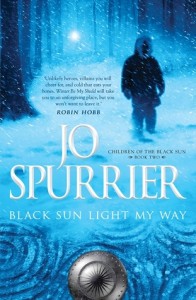
Well, another year another Australian Women Writers challenge. In 2014 I read 10 books by Australian women and reviewed all 10. The reviews can be found here in all, and individually:
- The Ambassador’s Mission by Trudi Canavan
- The Rogue by Trudi Canavan
- The Traitor Queen by Trudi Canavan
- Winter Be My Shield by Jo Spurrier
- Black Sun Light My Way by Jo Spurrier
- North Star Guide Me Home by Jo Spurrier
- Secret Lives by Rosaleen Love
- Musketeer Space by Tansy Rayner Roberts
- Kaleidoscope edited by Alisa Krasnostein and Julia Rios
- The Female Factory by Lisa L Hannett and Angela Slatter
In previous years I found it relatively easy to complete the challenge, whereas this year I was reading right up until Christmas, and had to post the last 6 reviews into January. I’ve been reflecting on why I had more trouble this year with the challenge.
First up, it can’t be denied that I don’t actually get time to read very many books in a year. 10 books actually represents a not insignificant percentage of my total reading for the year.
Secondly, due to my work and home schedule, I did find myself diving into some less challenging “comfort reading” of series that didn’t tax my brain too much. This included reading a set of Star Wars novels and revisiting one of my reading loves of my teenage years, the Wild Card series. While these novels had a mixture of female and male authors, none of them were by Australians. This took out a fair chunk of my reading time between about July and October in 2014 – and didn’t help me contribute to the challenge at all.
But when I strip out these “time poor” excuses, I also noted another trend. Over the last couple of years I have been reading more women (and Australian women) authors. However, I’ve continued to buy books by a mixture of men and women, but just not reading a lot of the books by men. As a result, my “to be read” shelf has become weighted towards male authors. So when I started to feel guilty about the to-be-read shelf and decided to try and reduce it a bit before buying more books, I found myself reading mostly male authors. This seemed to hit a bit of a critical mass during 2014. Something to keep an eye on in the future.
What else have I noted about my 2014 reading? Six of my ten novels were made up of two trilogies. Reviewing books in trilogies so close to each other was challenging – my reviews felt repetitive to me and I found myself without many interesting things to say.
I also cheated a bit in this years challenge. One of my reviews was of a work in progress by Tansy Rayner Roberts, who is releasing Musketeer Space as a serialised novel. So the book isn’t actually finished yet. I also reviewed Kaleidoscope, which is an anthology made up of many writers, only a few of which were Australian. However it was co-edited and published by an Australian woman, so I decided to stretch the definition a little.
In both cases, including the reviews was partly to help me hit the target, but was also because each endeavour represented something innovative and a bit different creatively, showing Australian women at the cutting edge of what the speculative fiction scene is doing at the moment. I’ll leave it to others to judge whether those reviews were “really” part of the AWW challenge – I’m still claiming a challenge “win”!
I also realised that I’ve leaned pretty heavily on the Twelve Planets series published out of Twelfth Planet Press, and that The Female Factory (my last review of the year) was book 11 of a 12 book series (although I believe a “13th planet” may have been added to the lineup). So, I’ll have to look a bit further afield in 2015!
Once again, the AWW challenge has pushed me to seek out and read more books by Australian women. I’m definitely signing up for the 2015 challenge – and if you’re reading this, you should too!










